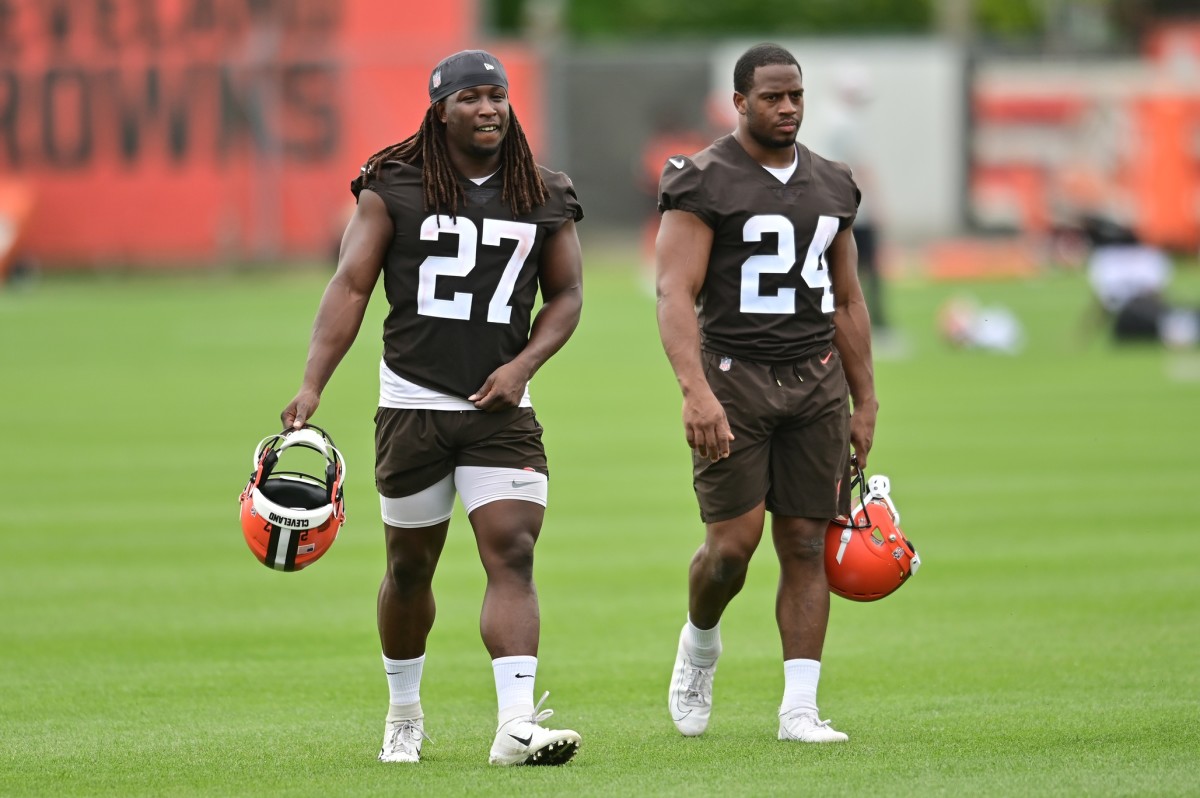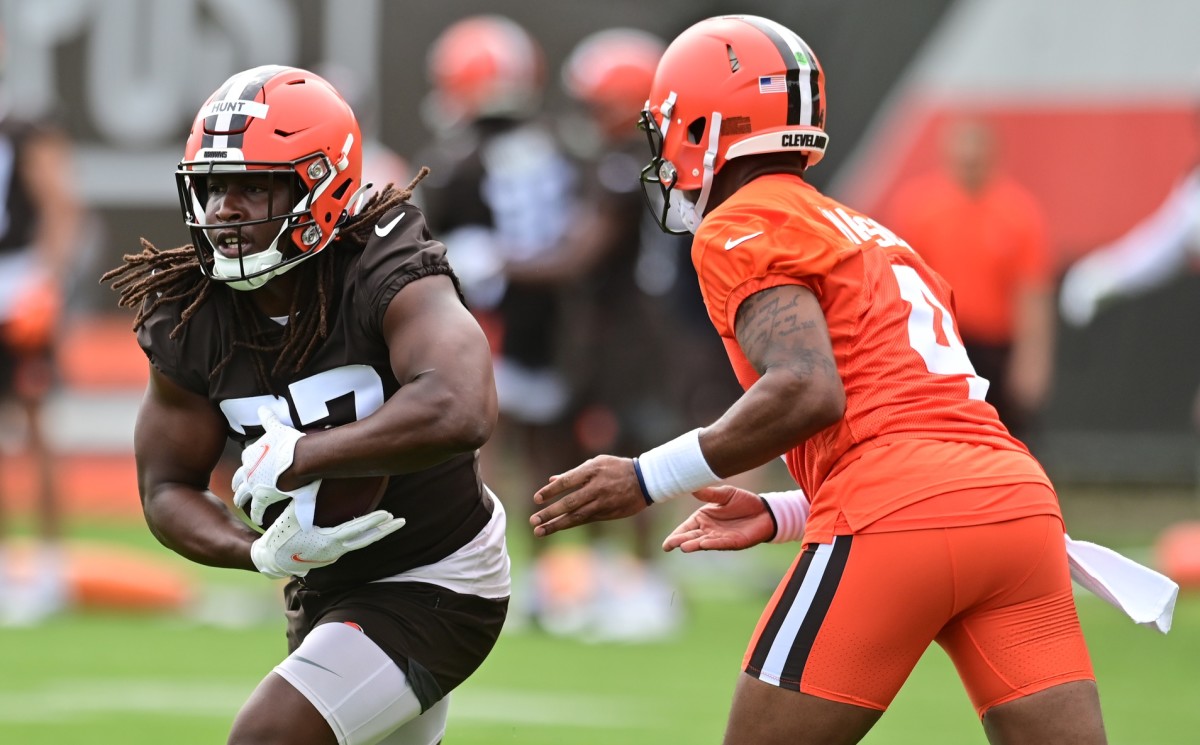Kareem Hunt Contract Extension is Feasible, Largely Depends on Browns Vision for Offense
With Kareem Hunt entering the final year of his contract, the Cleveland Browns will make a determination on how they want to proceed from here. It's possible the Browns could extend Hunt, but because of the way his current contract is structured, it's prudent for the Browns to wait to see how the 2022 season goes, which includes just how much they intend to use him.
Hunt reportedly is seeking an extension, which is understandable. He will be a 27-year old running back on the last year of his deal. Hunt likes his situation in Cleveland, but he also wants to get as much money as he possibly can, because his own actions off the field have limited his earning power on it.
For the Browns, Hunt is a useful player in their offense. He is their best option on third down and their most trusted short yardage back, but has more than enough ability to produce on any down. Hunt is a productive receiving threat. As a runner, Hunt is reasonably effective, averaging 4.4 yards per carry in his time with the Browns. On most teams, that's a pretty good average, but when contrasted against Nick Chubb and D'Ernest Johnson, who have averaged 5.3 yards per carry, it's pretty ordinary, though Johnson only has 137 carries to this point.
Chubb's contract plays a sizable role in any conversation in extending Hunt. Chubb's contract for 2022 is actually lower than Hunt's against the cap, which is why they are able to effectively coexist. However, Chubb's contract will escalate to $14.85 million in 2023 and then $16.2 million in 2024.
The way the Browns have done extensions, they could make Hunt's first year pretty low against the cap. It becomes more challenging in the following years when the money catches up to the overall value of the deal. Hunt's current two-year deal averages a little over $5.5 million per season If Hunt simply took that same value on his next deal, estimating a $2 million signing bonus, the Browns could theoretically give him a three-year deal that gives him approximately $3.3 million in 2023, $5.3 million in 2024 and $8.1 million in 2025. If they re-up Chubb again following the same formula as his current deal, it'd be easy to fit around Hunt's salary in 2025.
2024 would add up to significant chunk of change for the running back position as just Chubb and Hunt would combine for $21.5 million based on projected figures, which in itself is an argument against the move.
![Browns running back Kareem Hunt (27) celebrates with teammates after scoring during the second half against the Baltimore Ravens, Monday, Dec. 14, 2020, in Cleveland, Ohio. [Jeff Lange/Beacon Journal] Browns 22](https://www.si.com/.image/t_share/MTkwMzEyNTgwODE4OTM3MDky/usatsi_17240852_168388069_lowres.jpg)
The argument for retaining Hunt is dependent on his usage, both in terms of volume as well as alignment. Between a suspension for kicking a woman in a Cleveland hotel that caused him to be suspended half the season in 2019 and then an ankle injury that cost him nine games in 2021, Hunt has played one full season in three years and played in 34 games out of a possible 51 games. Hardly ideal.
The 2020 season is the best argument for keeping Hunt after this season. In the regular season, Hunt was on the field for 51.5 percent of offensive snaps. Some of that was as a result of Chubb missing a month with a knee injury, but discounting that four week stretch, Hunt's average only drops from 34.25 offensive snaps per game to 31.5.
Hunt got the ball on 43 percent of snaps he was on the field. He rushed for 841 yards on 198 carries, a pretty modest 4.2 yards per carry. In the passing game, he caught 38 passes on 51 targets for 304 yards, averaging 5.9 yards per target. In all, that's a total of 1,145 yards and to go along with an impressive 11 touchdowns.
His postseason performance was even better, averaging 4.88 yards per carry and scoring three touchdowns in two games.
It's easy to point to this and call it a success. There's room for improvement in terms of efficiency but weighing the cost against production, the Browns have to be thrilled to get this type of output.

Despite this, there is criticism that the Browns have not done enough with Chubb and Hunt together on the field at the same time. The inescapable fact for the Browns is since Chubb and Hunt have been on the team together, they are among the best 11 players on offense in any given situation. That alone would be an argument they should be on the field together more. So that criticism is warranted, even if the 2021 season provided a logical counterargument. Hunt missed nine games due to injury while Chubb missed three.
However, the Browns appear to at least be preparing themselves to be able to use Chubb and Hunt together far more often in 2022. The team re-signed D'Ernest Johnson, the logical backup to Chubb and then drafted Jerome Ford in the fifth round of the 2022 NFL Draft, the most logical backup to Hunt. They also still have Demetric Felton, who was utilized as a back as well as a receiver in his rookie campaign, though if he's going to contribute for the Browns, it may be from the practice squad.
It at least appears as the Browns have determined that a traditional fullback is a practice squad position. Johnny Stanton is currently the only fullback on the Browns roster. He operated as the backup to Andy Janovich the previous two seasons, but Stanton was always on the practice squad. They could activate Stanton as they needed him, but teams weren't trying to sign him away from the Browns. The Browns could use a tight end in a pinch. Hunt has been a lead blocker at times and Ford might be able to contribute in that capacity as well.
Since the Browns don't appear to be using an active roster spot on a fullback, that will give them the freedom to carry four running backs into every game. Presumably, that's with the intent of using them. At the very least, it provides insurance if Chubb or Hunt need a breather or get nicked up in a game.

The Browns should use Chubb and Hunt together in the backfield. One of the popular trends in college football the last several years is employing a two-back offense. Lincoln Riley, now the head coach of the USC Trojans, employed a two-back look throughout his time at Oklahoma, putting up prolific numbers in the process.
Pistol is a popular way to align in the backfield for this offense. This does create some different ways to run the ball, especially since either Chubb or Hunt can line up as a single back or in the side car position. In the passing game, it's a great way to put stress on linebackers, especially with a player like Hunt as a pass catching threat. Whether the Browns motion him or simply have him run routes out of the backfield or line him up out wide, the defense must account for him.
The Baltimore Ravens have routinely had one of the best secondaries in the NFL, but Kareem Hunt has consistently been a thorn in their side because their linebackers struggle to stay with him and he's been able to find success against their defensive backs.
The Browns have high expectations for Amari Cooper and David Njoku. Depending on the development of players like Donovan Peoples-Jones, Harrison Bryant, Anthony Schwartz and David Bell, Hunt is often going to be one of the best 11 offensive players to put on the field.
Using a two-back offense becomes that much more attractive with a quarterback who can create with their legs. It's one more threat the defense has to account for, which can help create running lanes and passing windows. Having a two-back look in the passing game can create a layered effect, which can aid spacing, potentially generating more opportunities for players like Cooper and Njoku to get open and maximize yardage after the catch.
The Browns have at least shown some two-back looks in OTAs and minicamp including with a pistol backfield. Kevin Stefanski, the team's head coach is at least exploring how this could benefit the team. If he makes this a featured part of their offense, it could enable Hunt to enjoy his most productive season with the Browns, including a higher rushing average. Should that happen, extending Hunt becomes a more attractive option and they could potentially work something out during the season. He's not just another running back at that point. Hunt would then be a weapon and a focal point of the offense.
However, should the Browns largely operate in an offense where Chubb and Hunt take turns being on the field, then extending Hunt makes little sense for the Browns and he'd be better off signing with another team focused on maximizing his impact.
